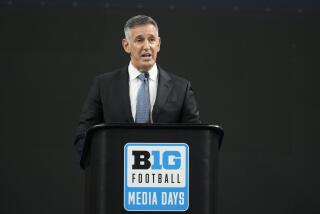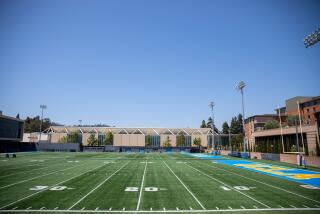UCLA’s Reversal Apparently Spurs Tournament Talk
- Share via
You can thank UCLA for making possible the prospect of the Pacific 10 Conference staging an annual postseason basketball tournament for the first time in more than a decade.
Several sources Thursday confirmed that UCLA Athletic Director Pete Dalis voted in favor of staging the tournament, a pivotal swing in the process.
UCLA had been one of three schools--Stanford and Arizona the others--that had opposed the measure when it was last up for consideration.
Dalis was out of town and not available for comment.
It takes eight of the conference’s 10 presidents to approve the measure.
The recommendation is expected to be passed by the Pac-10 council on Oct. 3--only a 6-4 margin is required--and then will be forwarded to school presidents for an Oct. 23 vote.
If adopted, the tournament would be played at Staples Center in March 2002.
“It’s not a done deal,” Pac-10 Commissioner Tom Hansen said Thursday. “Everyone has to assume the presidents will vote as they did before.”
The Pac-10 previously staged a postseason tournament in the late 1980s, but it fizzled after four years largely because of poor attendance.
Why did UCLA switch?
The Bruins had opposed the measure for academic and financial reasons.
UCLA thought a four-day tournament was too taxing for its athletes. But the proposed eight-team tournament would last only three days: Thursday, Friday and Saturday.
“The plan that has been developed has alleviated that concern,” UCLA spokesman Marc Dellins said.
And so, too, have the financial concerns.
UCLA nets $150,000 to $200,000 for a nonconference home game, but would have to give up one game a year to play in the Pac-10 tournament.
In 1990, the last season of the tournament, each conference team received only $90,000.
But sources say the proposed tournament plan would net each Pac-10 team a minimum of $300,000.
Cal Athletic Director John Kasser said tweaks in the proposal were enough to sway UCLA’s Dalis.
“There are only eight teams instead of 10,” Kasser said of the format. “I think his concern was academics. But with it being played in L.A., it’s almost like home for him.”
The Pac-10 and Ivy League are the only major conferences that do not stage postseason tournaments.
Aside from the obvious financial benefits, Hansen thinks a postseason tournament would give the conference more national exposure in the days leading up to the NCAA tournament.
More to Read
Go beyond the scoreboard
Get the latest on L.A.'s teams in the daily Sports Report newsletter.
You may occasionally receive promotional content from the Los Angeles Times.







